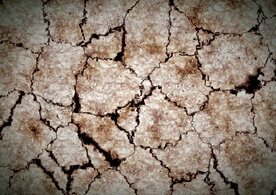
Visible signs of stress for hair include thinning of locks, hair loss and hair that lacks shine and luster. This is because stress restricts blood vessels depriving hair of oxygen, minerals, and vitamins essential for healthy hair growth and if stress is continuous even fewer of these hair growth nutrients will reach the scalp as when stress your body naturally directs this fuel to other more critical areas such as lungs and brain. In extreme cases a person can also end up suffering from a hair loss condition known as Alopecia.

When stressed the skin can dry out becoming dehydrated and lead to fine lines and premature aging which can be exaggerated by common stress induced facial expressions like frowning. Restricted blood flow from stress also contributes to a dull skin tone and can trigger breakouts and/or in some cases acne. Due to disruptions in sleep patterns, a critical time for the skin to repair, skin and even hair are weakened in general meaning usual routines for caring can become damaging. As the body releases hormones as a response to stress, these hormones can wreak havoc in terms of skin irritations and reactions to products, inflammation of skin and in some cases the development of pigmentation can occur.
During periods of stress nails can become brittle, break off and can also begin peeling. As is the case with hair and skin nutrients required for growth and repair are redirected away from the nails slowing growth and resulting in longer times to repair.

Cravings for high fat, high salt. high sugar or carbohydrate rich 'comfort' foods occur more frequently when highly stressed which are likey to result in unwanted weight gain. A 2000 Yale Study showed that higher levels of cortisol (stress hormone) is linked to increased abdominal fat. The types of food often craved also contribute to extra fat around the organs linking back to the health risks of stress.
Ways to deal with stress that are common include biting nails, picking at nails and cuticles as well as twirling and twisting hair. These habits can cause damage and if stress isn't alleviated can take a very long time to repair. In extreme cases hair can even be pulled out as a coping method. Instead of these coping habits activties that clear the mind and bring tranquity like yoga, reading or walking outdoors can be great alternatives.